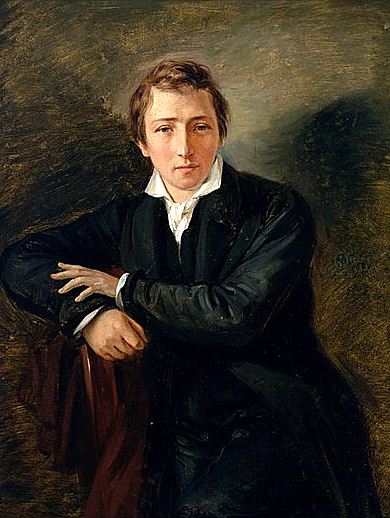Frases célebres de Heinrich Heine
Frases de hombres de Heinrich Heine
Heinrich Heine Frases y Citas
Heinrich Heine: Frases en inglés
History of Religion and Philosophy in Germany, Vol. III (1834)
Ich weiss nicht, was soll es bedeuten,
Dass ich so traurig bin;
Ein Märchen aus alten Zeiten,
Das kommt mir nicht aus dem Sinn.
Die Lorelei, st. 1
“Christianity is an idea, and as such is indestructible and immortal, like every idea.”
History of Religion and Philosophy in Germany, Vol. I (1834)
Lutetia; or, Paris. From the Augsberg Gazette, 12, VII (1842)
“The music at a wedding procession always reminds me of the music of soldiers going into battle.”
As quoted in The Cynic's Lexicon : A Dictionary of Amoral Advice (1984) by Jonathon Green
Variant translation: The Wedding March always reminds me of the music played when soldiers go into battle.
As quoted in The Routledge Dictionary of Quotations (1987) by Robert Andrews, p. 281
Französische Bühne (The French Stage), ch. 9 (1837)
Original: (de) Die Menschen in jener alten Zeit hatten Überzeugungen, wir Neueren haben nur Meinungen, und es gehört etwas mehr als eine bloße Meinung dazu, um so einen gotischen Dom aufzurichten.
“True eloquence consists in saying all that is necessary, and nothing but what is necessary.”
François de La Rochefoucauld
Misattributed
As quoted in Dictionary of Quotations from Ancient and Modern English and Foreign Sources (1899) by James Wood, p. 6
Religion and Philosophy in Germany, A fragment https://archive.org/stream/religionandphilo011616mbp#page/n5/mode/2up, p. 26
“Every man, either to his terror or consolation, has some sense of religion.”
James Harrington in The Commonwealth of Oceana (1656)
Misattributed
“Out of my own great woe
I make my little songs.”
Aus Meinen Grossen Schmerzen (Out of My Great Woe), st. 1
"The History of Religion and Philosophy in Germany" (1834)
Wartet nur! [Only Wait!] in Poems for the Times ; also in Poems of Heinrich Heine: Three Hundred and Twenty-five Poems (1917) Selected and translated by Louis Untermeyer, p. 263
"The History of Religion and Philosophy in Germany" (1834)
French Affairs page 156
The Romantic School (1836)
Wenn man auch der protestantischen Kirche manche fatale Engsinnigkeit vorwirft, so muß man doch zu ihrem unsterblichen Ruhme bekennen: indem durch sie die freie Forschung in der christlichen Religion erlaubt und die Geister vom Joche der Autorität befreit wurden, hat die freie Forschung überhaupt in Deutschland Wurzel schlagen und die Wissenschaft sich selbständig entwickeln können. Die deutsche Philosophie, obgleich sie sich jetzt neben die protestantische Kirche stellt, ja sich über sie heben will, ist doch immer nur ihre Tochter; als solche ist sie immer in betreff der Mutter zu einer schonenden Pietät verpflichtet.
Fuente: The Romantic School (1836), p. 24
Ich spreche von jener Religion, in deren ersten Dogmen eine Verdammnis alles Fleisches enthalten ist, und die dem Geiste nicht bloß eine Obermacht über das Fleisch zugesteht, sondern auch dieses abtöten will, um den Geist zu verherrlichen; ich spreche von jener Religion, durch deren unnatürliche Aufgabe ganz eigentlich die Sünde und die Hypokrisie in die Welt gekommen, indem eben durch die Verdammnis des Fleisches die unschuldigsten Sinnenfreuden eine Sünde geworden und durch die Unmöglichkeit, ganz Geist zu sein, die Hypokrisie sich ausbilden mußte.
Fuente: The Romantic School (1836), p. 3
As quoted in The Pillars of Economic Understanding : Factors and Markets (2000) by Mark Perlman and Charles Robert McCann
<p>Ich hatte einst ein schönes Vaterland.
Der Eichenbaum
Wuchs dort so hoch, die Veilchen nickten sanft.
Es war ein Traum.</p><p>Das küßte mich auf deutsch und sprach auf deutsch
(Man glaubt es kaum
Wie gut es klang) das Wort: "Ich liebe dich!"
Es war ein Traum.</p>
In Der Fremde (In a Foreign Land)
Wartet nur! [Only Wait!] in Poems for the Times ; also in Poems of Heinrich Heine: Three Hundred and Twenty-five Poems (1917) Selected and translated by Louis Untermeyer, p. 262
Testamentary Will of Heinrich Heine (1856); no published source for this has been located.
Disputed
Heinrich Heine's Pictures of Travel (1855) as translated by Charles Godfrey Leland, p. 270
English Fragments (1828), Ch. 11 : The Emancipation
Variante: The weather-cock on the church spire, though made of iron, would soon be broken by the storm-wind if it did not understand the noble art of turning to every wind.
